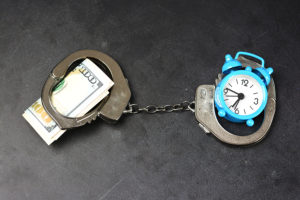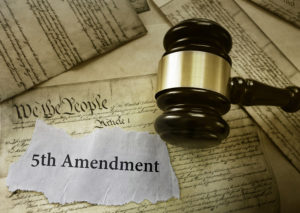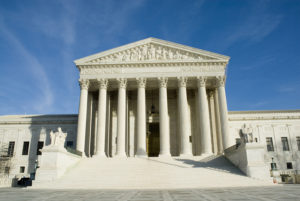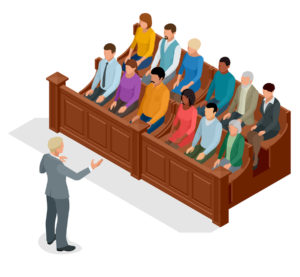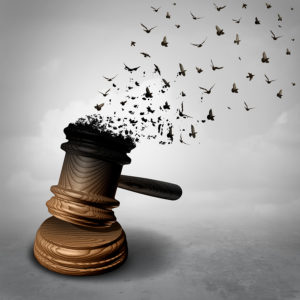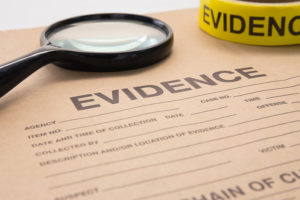In New York, graffiti is practically part of the local landscape. Everywhere you go, you see bright lettering, splashes of color, and even large murals displaying some personal, social, or political messages on the side of a building and on or around bridges and overpasses. Although graffiti makers and their supporters proclaim its artistic value, decorating someone else’s property without their permission is a Class A misdemeanor that can send the artist to jail for up to a year. New York City has various anti-graffiti task forces dedicated to stopping those who violate the state’s graffiti statute. The government offers cash rewards for information that leads to the arrest of violators and will even remove graffiti upon request. What counts as graffiti? New York law defines graffiti as marks that have been painted, drawn, etched, or otherwise placed on private or public property. For these marks to be considered graffiti,…
Read MoreDNA made its first appearance in the mid-1980s, but it wasn’t until 1987 that it became an integral part of the U.S. criminal justice system. On February 5 of that year, an Orange County, Florida jury convicted serial rapist Tommy Lee Andrews after tests matched his DNA to a semen sample taken from one of his victims. Since then, DNA evidence has come to be regarded as irrefutable: according to a 2005 Gallup poll, 85% of people saw it as “very” or “completely” reliable. That’s a lot of faith in a process that, for all its advantages, is as vulnerable to errors and mishandling as any other. Common examples of DNA evidence collected at crime scenes include: Semen Blood Skin particles Hair follicles The larger the sample, the easier it is to test for accurate results, but errors still occur. Below are three common mistakes related to DNA evidence. Timing…
Read MoreTraditionally, the only way to post bail for someone in New York City was to make the payment in person at one of the jails or courts. A fax message was then sent to the facility holding the person to indicate that their bail was posted and they were free to go. The system’s flaws became glaringly evident in mid-April when a broken fax machine forced inmates to remain behind bars, even though friends and family had posted bail. Now, bail set at $2,500 or less can be paid online with a credit or debit card. Who is eligible for online bail? Even if an arrestee’s bail does not exceed $2,500, some conditions and limitations can affect their eligibility. They include: A judge has to set credit cards as an approved form of bail payment for the person in question There can be no surety conditions that apply to the…
Read MoreManhattan District Attorney Cyrus R. Vance has confirmed that starting August 1, his office will no longer be prosecuting marijuana smoking and possession cases. The announcement was the result of six months of policy analysis and research that included discussions with legal authorities in areas where marijuana possession and use is no longer a criminal offense. Mr. Vance also released a report summarizing its findings, which helped to shape the new policy. The DA explained that the purpose of the policy is to support a fairer justice system. At present, more black and Hispanic individuals are being charged with marijuana offenses in their respective neighborhoods than those residing in predominantly white communities. These arrests affect a person’s employability, access to education, and even immigration status, leaving a high number of New Yorkers limited in their prospects and alienated from law enforcement. Concerned by the racial disparities in enforcement, DA Vance began…
Read MoreDid you know that if you are convicted of a federal offense that you stand to lose more than your freedom? Using a process known as criminal forfeiture, the government can seize certain assets and property after and, in some instances, before your conviction. Criminal vs. civil forfeiture Criminal forfeiture is part of an overall criminal prosecution proceeding. It requires that in addition to the defendant, the government indict the property that either Was used to commit the crime, or was Derived from criminal activity, such as financial gain Upon conviction, you are required to forfeit these assets to the government. Criminal forfeiture differs from civil judicial forfeiture in that a conviction is required before the government can seize the property. For this reason, criminal forfeiture is an in personam (against the person) action as opposed to an in rem (against the property) proceeding. Its purpose is to deter and…
Read MoreWe hear the term “double jeopardy” thrown around a lot in courtroom dramas and there’s even a 1999 movie of the same name. Despite—or perhaps because of—the fact that the term is so prevalent in popular culture, the true meaning is not well understood outside of the legal profession. Double jeopardy, which is referenced in the Fifth Amendment, confirms that under most circumstances, a criminal defendant who has been acquitted (or even convicted) may not be tried again for the same offense. It also prohibits the application of more than one punishment for the same offense. When does double jeopardy “attach?” For a criminal defendant to be protected by this Fifth Amendment clause, the government must place him or her “in jeopardy.” This typically takes effect the moment that the court swears in the jury or, in a trial before a judge, after the first witness is sworn in and…
Read MoreCrime TV has been entertaining us for generations. From the black and white Perry Mason courtroom dramas to the dark and gritty episodes of Law and Order, we’ve been educated on how the criminal justice system works—or have we? These shows are so engaging and well-written that it’s easy to forget that they only imitate life, they don’t reflect it. The crime, its investigation, and both the arrest and trial of the suspect are packed into a single hour, which is definitely not how the system really operates. As a result, many people charged with criminal offenses in New York State have an incorrect understanding of how crimes are investigated and can unwittingly harm their own cases. Below is a list of some of the biggest criminal justice system myths that have been inspired by TV and movies. The police can make a deal with you We see it all…
Read MoreAt the end of November, the Supreme Court heard opening arguments in Carpenter v. United States, a landmark digital privacy case. At issue is whether or not the police require a warrant to track the location of a smartphone. The case involves Timothy Carpenter, who was accused of joining several friends in robbing Michigan and Ohio electronics stores between December 2010 and March 2011. Four of his co-conspirators were arrested, and one of them surrendered his phone. A judge granted an order for the FBI to obtain transactional information from the cell phone providers for multiple numbers on the phone. A warrant was not granted, as authorities did not yet have probable cause to request one. The information retrieved revealed that Carpenter’s phone pinged cell towers in the vicinity of the robberies at the times they took place. This led to him being arrested, convicted, and sentenced to 116 years…
Read MoreHave you ever logged into your parents’ Netflix account? Let your brother use your login while he was visiting? Then you may have committed a federal crime. In July 2016, the U.S. Court of Appeals ruled that it was illegal to use another person’s password to access a service without the approval of the company that delivers the service. A three-judge panel upheld the 2013 federal conviction of the defendant, David Nosal, for six counts of violating the Computer Fraud and Abuse Act of 1986 (CFAA). In 2004 Nosal resigned from his employer, a Los Angeles-based recruiting company. Soon afterward, he persuaded three former coworkers to join him in a new, competing search and recruiting business. Before resigning from the employer, they downloaded proprietary and confidential information from the company’s computers for their own use. Four years later, Nosal and the three employees were indicted for 20 violations of the…
Read MoreArson became a big issue in New York City in the 1970’s. In fact, arson was what some would even consider a fact of life back then– in 1976, there were 13,752 reported cases of arson. Compare that to 2012 numbers like 2,000 and it is interesting to look back at how this issue evolved and what it means as a crime today. Arson is defined as the malicious or willful burning of property. This property crime can also be treated as a violent offense, and arson cannot be determined without a special investigation to determine whether the incident in question meets the standards. People who are victims of arson may not even know it since it is sometimes difficult to tell whether a fire was set on purpose or not. In the 1970s, societal issues were likely the cause of higher numbers of arson incidents. With many vacant buildings…
Read MoreValentine’s Day is only a few days away, reminding us that we have a limited amount of time left to buy chocolates and flowers and make romantic dinner reservations. These are standard ways that we celebrate the day with our significant other. But what if that significant other doesn’t feel the same way about you? Stalking is the unwanted and often obsessive pursuit of another person. Associated behaviors include following the person, calling and texting them, sending gifts, and showing up at their home unannounced. One recent example is that of Mohammed Jaffar, who hung around singer Taylor Swift’s New York condominium and rang her doorbell incessantly. He was arrested on burglary and stalking charges and ordered to stay away from the pop star. In New York, stalking is regarded as a type of criminal harassment. You can be charged if another person claims that despite being asked to stop,…
Read MoreNewspaper headlines everywhere are broadcasting the accusations of sexual misconduct currently being leveled at Hollywood producer Harvey Weinstein and many other public figures. Gwyneth Paltrow, Ashley Judd, and Angelina Jolie are among the actresses who have gone public with allegations of assault, harassment, and rape. A New York Times expose suggested that Weinstein has made eight financial settlements with women, including a $100,000 payment to Rose McGowan in 1997. The barrage of negative publicity surrounding the Hollywood titan confirms that sex crimes carry a powerful stigma. In addition to high fines and prison time, a conviction for assault, rape, or any other sex crime often requires the defendant to register as a sex offender with the Division of Criminal Justice Services. Your personal life, career, and reputation can be destroyed and even your future job opportunities can be compromised forever. With such a far-reaching and likely permanent set of consequences,…
Read MoreBeing accused of domestic violence can change your life forever, even if you are never convicted. It is one of those highly-publicized offenses that inspires powerful—and negative—emotions, so a mere accusation is enough to do irreparable damage to your reputation and future. What inspires false accusations? There are several reasons why your spouse or partner might falsely accuse you of abusing them. If the relationship is ending, then they may be trying to gain an advantage in a child custody battle. If they are emotionally unstable or believe that you have done something to slight them, then such an accusation can be a petty form of revenge. No matter what the accuser’s motivation might be, if you suspect that you might be targeted, taking action to protect yourself is imperative. Below are some steps you can take to minimize any damage done by a malicious accusation. Tell someone Keep your…
Read MoreFor many people, it’s a phenomenon that has gone unpunished for far too long. Seductive and even sexually explicit images or videos of men and women are regularly posted online, usually as an act of revenge by former sexual partners. Dubbed “revenge porn,” it has caused embarrassment, distress and depression that some victims find impossible to live with. The issue has made headlines in recent years due to the high number of celebrities who have been targeted. During the 2014 Labor Day weekend, Jennifer Lawrence, Kate Upton and other famous actresses, singers and athletes had intimate photos stolen by unknown hackers and shared on community sites like Reddit and 4chan. More recently, in March 2017 the former boyfriend of actress Mischa Barton started offering around nude photos of her. She took him to court and won her case the following June. Her ex was ordered to hand over all explicit…
Read MoreA lot of confusion exists about the difference between a trial jury and a grand jury, as well as their respective roles in a New York criminal case. Let’s define each one and take a close look at how they work in the criminal justice system. Trial juries When you watch a news report or courtroom drama on television, you’re seeing the trial jury. Usually, twelve people are selected to decide whether a specific defendant is guilty or not guilty of a felony, all of them members of the community drawn from a jury pool. The trial takes place in a public courtroom in front of a judge, who has control over the proceedings. A trial jury does not usually get to ask questions of any witnesses, and has no input into the trial itself. (Some states, not NY, allow jurors to pose questions) Once all of the evidence has…
Read MoreThe recent Equifax data breach has been cited as one of the biggest incidents of its kind. It highlighted the alarming reality that every person and company can have their sensitive information stolen by hackers at any time and spawned dozens of class action lawsuits filed by both consumers and shareholders. Lawmakers are now reconsidering the advantages of new federal legislation for both breach notification laws and cybersecurity standards. New York cyber crimes As cyber crime continues to rise, so does the dedication of law enforcement officials to catching the parties responsible and holding them accountable. There is a long list of computer-related crimes in New York’s penal code, many of which are listed below. Computer tampering: This offense has four degrees, beginning with the basic crime of using a computer to intentionally alter or destroy someone else’s data and escalating all the way up to Computer Tampering in the…
Read MorePresident Donald Trump’s recent pardon of former Sheriff Joe Arpaio has drawn public attention to the pardoning process in general. What is the basis of such a decision? Is there a difference between a presidential and gubernatorial pardon? Are there some offenses that cannot be pardoned? This post will explain how the pardon system works at the state and federal levels as well as who is eligible. Overview In summary, a pardon exempts a person or group from being punished for their alleged criminal offense. The decision to grant one rests solely in the discretion of the executive with pardoning power which, depending on the crime, may be the president, governor or, in some states, the Pardon Board. Once made, it is not typically subject to judicial review and cannot be revoked unless the offender obtained it via fraud. It is important to remember that there are some limits to…
Read MoreAlthough the law in New York requires both sides to disclose their discovery material prior to trial, civil and criminal proceedings have vastly different timelines in that regard. In a civil case, attorneys for each side can interview the other’s witnesses for depositions and in general benefit from complete and total discovery. Criminal cases are different: prosecutors are not required to turn over police reports and witness statements until the 11th hour, a situation that has been commonly referred to as the “blindfold law”. New York is one of four states (the others being Louisiana, South Carolina, and Wyoming) that allows prosecutors to withhold evidence from the defense until the day of the trial. Assemblyman Joseph Lentol has been pushing for a repeal of what many are decrying as one of the country’s most restrictive discovery processes. Supporters of Lentol’s bill, A7292, are complaining that such a system makes it…
Read MoreWhile the U.S. Constitution guarantees your right to freedom from unreasonable search and seizure, there continue to be instances where law enforcement officers violate that right, either through negligence or simple and willful disregard. The result is a huge—and growing—body of law that focuses on interpreting when and under what conditions a search and seizure is reasonable. Federal District Court Judge Alison J. Nathan recently sent a strong message to prosecutors and the police when she granted a motion by New York City financier Benjamin Wey to suppress all evidence seized during a 2012 search of his home and office. If her ruling is upheld, then it could make it highly difficult to prove the stock manipulation and money laundering charges that were filed against Wey in 2015. Under the Fourth Amendment, a warrant is required to “particularly” describe the premises to be searched and the items seized. This is…
Read MoreAs the Fourth of July draws ever closer, more New Yorkers are eagerly making plans for traditional holiday pastimes: getting together with family and friends, hosting lively backyard barbecues and, above all, lighting fireworks. One might argue that no celebration of the Fourth is complete without the latter. When it comes to private fireworks shows, New York law imposes firm restrictions. In 2014, Governor Cuomo approved the use and sale of sparkling fireworks during specific time periods, namely from June 1 to July 5 for the Fourth celebrations and December 26 to January 2 for New Year’s Eve, but only in counties where local laws permitted them. This concession was, and still is, intended to stop people from buying fireworks in Pennsylvania and other neighboring states. By definition, “sparkling” fireworks are those that produce a shower of sparks as their primary pyrotechnic effect and do not explode, fire projectiles or…
Read More


